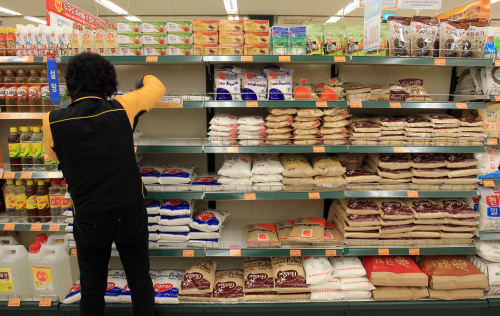Government to announce price control steps next week
Rising consumer prices led by food and fuel costs alarmed policymakers prompting President Lee Myung-bak to declare “a war against inflation” Tuesday.
The government is working on measures to stabilize prices before the country scrambles to buy food and gifts for the Feb. 3 Lunar New Year celebrations.
Food companies are rushing to raise prices following industry leader CJ Group’s 9.7 percent price increase of raw sugar at the year-end.
Beverage manufacturer Coca Cola increased their prices by between 4.2 percent and 8.5 percent on Jan. 1.
The country’s No. 1 tofu maker Pulmuone also raised the price of its tofu by 27 percent, pressuring the prices of dairy products, which are often substituted for by soya products, to rise. The foot-and-mouth disease outbreak is also set to affect meat prices.
An insider at the milling industry said a sector-wide rise in the price of wheat flour would come on Jan. 15 which would fan price increases of bread, ramen and other foodstuffs.
 |
A clerk arranges sugar and other goods at a Seoul supermarket on Tuesday. (Yonhap News) |
Regulators declared their promise to fight inflationary pressure but analysts say the pressure is unlikely to subside soon due to growing domestic consumption and rising cost of commodities.
President Lee called for efforts to contain inflation during this year’s first cabinet meeting Tuesday.
“I want (the cabinet members) to make efforts to suppress consumer price growth, taking a ‘war on prices’ attitude,” Lee said.
Finance Minister Yoon Jeung-hyun, new Fair Trade Commission Chairman Kim Dong-soo and other top policymakers made price control their top policy priority.
“We would have to work closely with other government agencies to take pre-emptive steps in price control,” Kim said in his inaugural address Monday.
“The Fair Trade Commission can do its part by improving distribution structure.”
The government plans to announce a package of price control measures on Jan. 13. The plan, headed by the Finance Ministry, aims to curb increases of food prices, university tuition fees and public utility costs, sources said.
Rising prices are also increasing pressure for the Bank of Korea to raise the benchmark interest rate this month.
Korea’s average inflation rate remained at the moderate level of 2.9 percent for the whole year in 2010 but food prices advanced to a 16-year high in the second half of the year due to bad weather.
Fresh food prices for December advanced 33.8 percent year-on-year from continued shortages of vegetables in the cold snap.
Price hikes are expected to continue in the lead up to the Lunar New Year holiday.
“The foot-and-mouth disease could push up the price of fish by about 20 percent in the coming weeks as a lot of people will choose seafood as a substitute for beef,” an official from giant retailer E-mart said.
Inflation fear has been rising in most emerging economies of Asia including China, India, Indonesia, Singapore and Taiwan.
Wen Jiabao, the Chinese prime minister, on Sunday made a commitment to bring price rises under control, especially for food and housing.
“I am confident that housing prices will return to a reasonable level through our efforts,” Wen said in an interview.
The People’s Bank of China raised interest rates on Christmas day after the consumer price index rose to a 28-month high of 5.1 percent in November.
The central banks of Indonesia and Taiwan brought in fresh administrative controls on exchange transactions to fight asset price bubbles expected with fast inflow of capital.
By Cynthia J. Kim (
cynthiak@heraldcorp.com)


![[Herald Interview] 'Korea, don't repeat Hong Kong's mistakes on foreign caregivers'](http://res.heraldm.com/phpwas/restmb_idxmake.php?idx=644&simg=/content/image/2024/11/13/20241113050481_0.jpg)
![[KH Explains] Why Yoon golfing is so controversial](http://res.heraldm.com/phpwas/restmb_idxmake.php?idx=644&simg=/content/image/2024/11/13/20241113050608_0.jpg)




